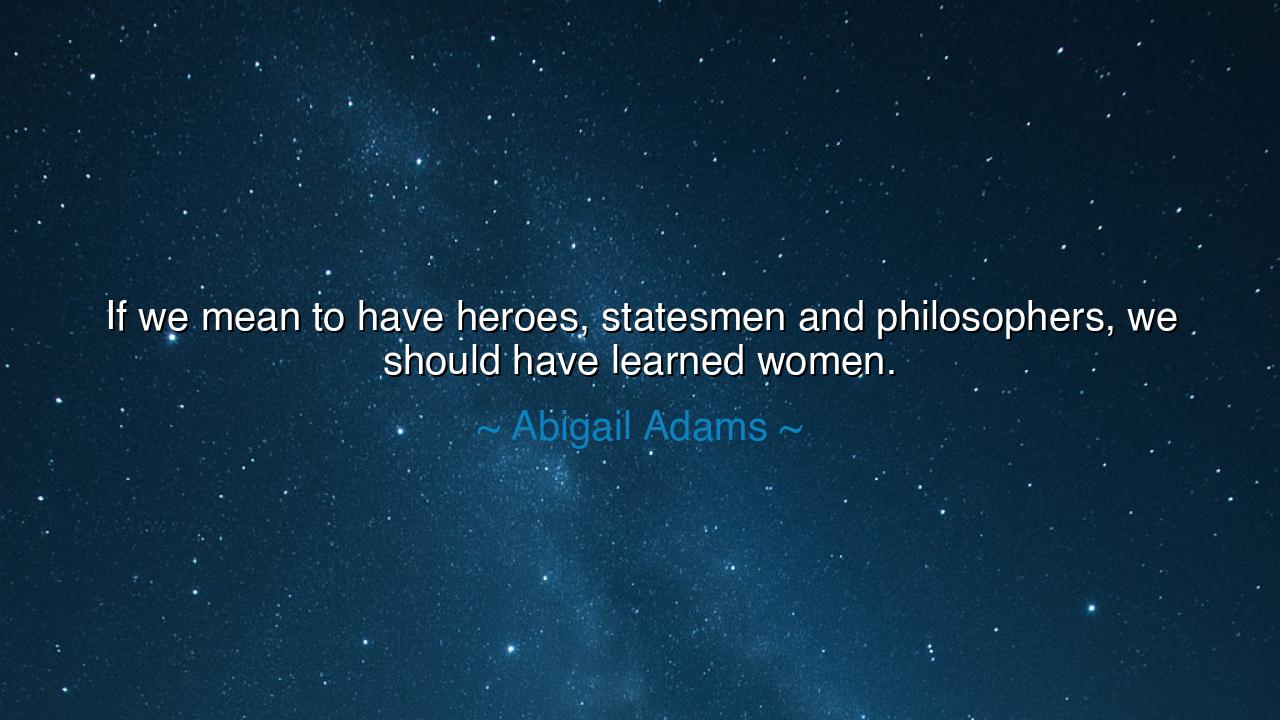
If we mean to have heroes, statesmen and philosophers, we should






Abigail Adams, wife of a president yet greater than that title, spoke with prophetic clarity when she declared: “If we mean to have heroes, statesmen and philosophers, we should have learned women.” In this truth she saw the foundation of nations—not in armies, nor in treasuries, but in the minds that nurture the future. For every hero springs from a mother’s teaching, every philosopher first drinks wisdom at a mother’s knee, and every statesman carries within him the early shaping of a woman’s voice. To deny women learning, then, is to cripple the very roots of greatness.
The origin of this quote lies in her fierce letters to her husband, John Adams, during the birth of the American Republic. While men debated liberty in halls of power, she reminded him that the cause was hollow if women were forgotten. She knew that the republic could not flourish if half its people were denied the light of education. To her, women were not ornaments of society but pillars, shaping the morality and intellect of generations. Thus she demanded not flattery but learning, not hollow praise but the tools of wisdom.
History confirms her vision. Consider Socrates, whose philosophy shook Athens and still guides the world. His mind was sharpened in part by the questions and intellect of Diotima, the wise woman he himself called teacher in matters of love and truth. Had her voice been silenced, how much poorer would the world have been? Likewise, in every age, where women have been allowed to learn, civilization has advanced; where they have been silenced, it has stumbled in darkness.
Even in the story of America, the strength of heroes was often carried by the wisdom of women. George Washington’s mother, Mary, taught him discipline and honor. The courage of Frederick Douglass was stirred by the forbidden lessons of women who risked punishment to teach him to read. These examples are not accidents; they are proof that the rise of great men is inseparable from the knowledge passed to them by women.
Therefore, O seekers of justice, remember Abigail’s wisdom: to deny women education is to deny the world its future. If we hunger for statesmen to govern with wisdom, if we yearn for philosophers to guide our minds, if we hope for heroes to defend what is right, then we must give women the same flame of knowledge we give to men. For the torch of learning cannot burn bright if it is withheld from half of humanity. A learned woman is not a threat, but the very soil from which greatness grows.






VANguyen Van An
Does Abigail Adams' quote challenge the view that women’s roles are primarily domestic or supportive? By linking the production of great figures like philosophers and statesmen with the education of women, is she advocating for systemic change in the way we view women’s contributions to society? How can we work toward ensuring that women have the same opportunities for intellectual and professional development as men?
GHTran Giang Huy
Is Abigail Adams suggesting that the advancement of society depends on the intellectual empowerment of women? If we want to have impactful leaders, thinkers, and visionaries, shouldn’t women be encouraged to pursue education and intellectual growth? How might the social and political landscape change if we truly supported the intellectual development of women in all spheres of life, just as we do with men?
TTTho Tran
Could Abigail Adams’ statement be seen as advocating for gender equality in intellectual and political arenas? If we want to produce great minds like heroes, statesmen, and philosophers, shouldn’t we start by ensuring that women have equal access to education? How has the historical underrepresentation of women in these fields affected society’s ability to progress, and what can we do to address this gap today?
TPNguyen Thanh Phong
What does Abigail Adams mean by 'learned women'? Is she suggesting that intellectual development is essential for women to contribute meaningfully to society, particularly in roles like leadership or philosophy? How does this challenge traditional views of women’s roles during her time? Could it be that today’s society still faces barriers to women accessing education and intellectual spaces, limiting their potential as leaders?